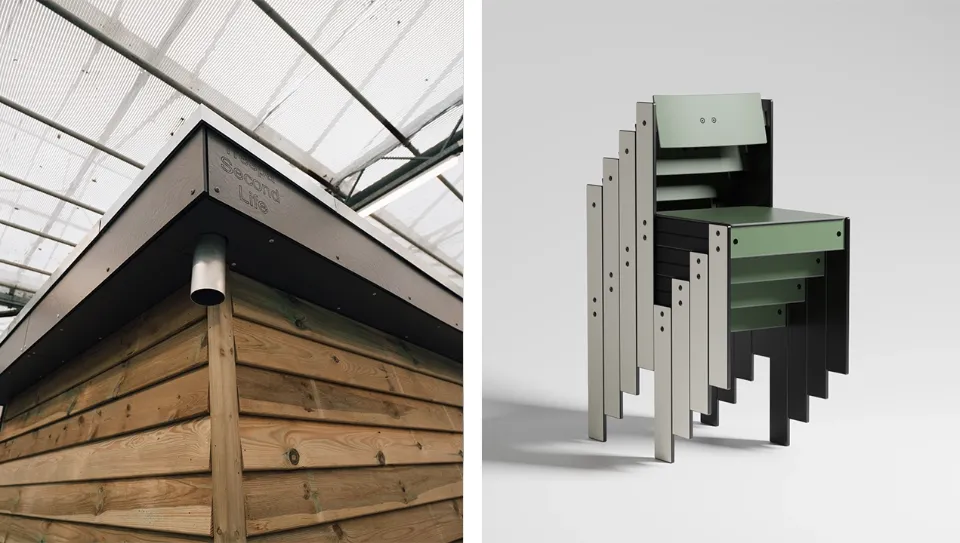
Trespa Second Life
Giving Trespa® Panels a Second Life
At Trespa, we are committed to sustainability by extending the lifespan of our panels. Through strategic partnerships with like-minded organisations, we actively drive innovation in material reuse.
Introducing Trespa Second Life, a pioneering initiative that repurposes our durable panels for new applications such as playgrounds, sheds, furniture, signage and more.
We believe that meaningful change comes through collaboration. By embracing Trespa Second Life, we collectively reduce environmental impact while maintaining the quality and performance architects expect.
LESS IS MORE
- Less waste
- Less CO₂ emissions
- More longevity

Our Focus: Reuse, not recycle
Reusing building materials is not only an environmentally responsible choice, but also a highly efficient one.
The advantages of reuse
- More sustainable: Reuse consumes less energy and raw materials compared to recycling, reducing environmental impact.
- Direct reuse: Thanks to their exceptional durability, Trespa® panels can be repurposed immediately, without the need for extensive processing.
By prioritising reuse, we extend the lifecycle of materials, minimize waste, and contribute to a circular economy.


Extending Carbon Storage with Trespa Second Life
Trespa® panels are designed to store carbon for longer, reducing environmental impact. Made with at least 58% bio-based materials (wood fibres), our panels originate from forests and crops that naturally absorb CO₂ from the atmosphere during growth and continue to store it after harvest.
Each square meter of Trespa® Meteon® FR 8mm panels stores approximately 12 kg of CO₂ equivalent. By giving Trespa® panels a second life, we reduce their total environmental impact by around 25% over their entire lifespan.
With Trespa Second Life, we extend the period during which carbon remains locked within our panels, contributing to a more sustainable built environment.


How to submit your project for Trespa Second Life
1. Eligibility check: To qualify for Trespa Second Life, panels must meet the following criteria:
- Carefully dismantled and removed without excessive damage
- Not exposed to hazardous materials
- Mechanically attached (not glued)
- They need to be verified as authentic Trespa panels
Additionally, Trespa will assess the environmental impact of transportation to ensure that reuse provides a net sustainability benefit.
Note: Currently, Trespa Second Life only operates in the Netherlands, France, Germany, and Belgium, with plans for future expansion.
2. Express interest: If you have Trespa® panels that may qualify, contact us at secondlife@trespa.com with details about the materials.
3. Evaluation: Our team will assess the request and determine eligibility for take-back.
4. Reuse & collaboration: If approved, the panels will be repurposed for various applications, including (bike) sheds, storage, garden applications, signage, waste separation bins and more; through collaborations with our partners.
Get Inspired by applications made from reused Trespa® panels
Discover innovative projects from the Trespa Second Life program:
- Constructif designed a durable shed using repurposed Trespa® panels, showcasing the potential of reused materials for practical outdoor applications.
- Duplex Studio transformed used Trespa® panels into stylish, functional chairs, proving the versatility and design possibilities of repurposed materials.

Watch how we transform 38-year-old Trespa® panels into a sustainable solution
In this video, we show how 38-year-old Trespa® panels from Almere, Netherlands, are transformed. Retrieved and transported to Duplex, Belgium, they are cleaned, chamfered, and repurposed, extending their lifespan and continuing to keep carbon stored.
Looking for high quality used Trespa® panels?
You can now purchase used panels through the Trespa Second Life program. For details on available panels and our selection process, reach out to us at secondlife@trespa.com

Frequently asked questions
Participation is free, but building owners or renovation contractors are expected to dismantle and store the panels according to Trespa's instructions.
Trespa Second Life is intended for used panels, but Trespa is interested in better understanding cut-offs regarding sizes and volumes.
To arrange take-back, panels should be dismantled without damage, placed on pallets according to Trespa's instructions, and stored in a dry, frost-free area until pick-up. Accessibility of the site by a 16,5M truck and availability of a forklift need to be considered.
Trespa will arrange pick-up in the Netherlands, Germany, France, and Belgium. For other EU Schengen zones a case-by-case approach will be taken.
We have calculated the environmental impact of transportation, including CO2 emissions, following our Life Cycle Assessment (LCA) methodology. This ensures the environmental benefits of reuse exceed the environmental cost of transportation.
A certificate will be provided as proof of participation in Trespa Second Life to those who send back used panels or reuse them in second-life applications.
Trespa is exploring applications like (bike)sheds, storage spaces, garden applications (furniture, houses, dividers, etc.), signage, and waste separation bins.
At present, panels cannot be reused as a façade component due to regulatory constraints. Trespa is actively monitoring developments on this topic.
If Trespa cannot take back the panels, an alternative could be to reach out to circular dismantler organisations.
 EN/GB
EN/GB
















